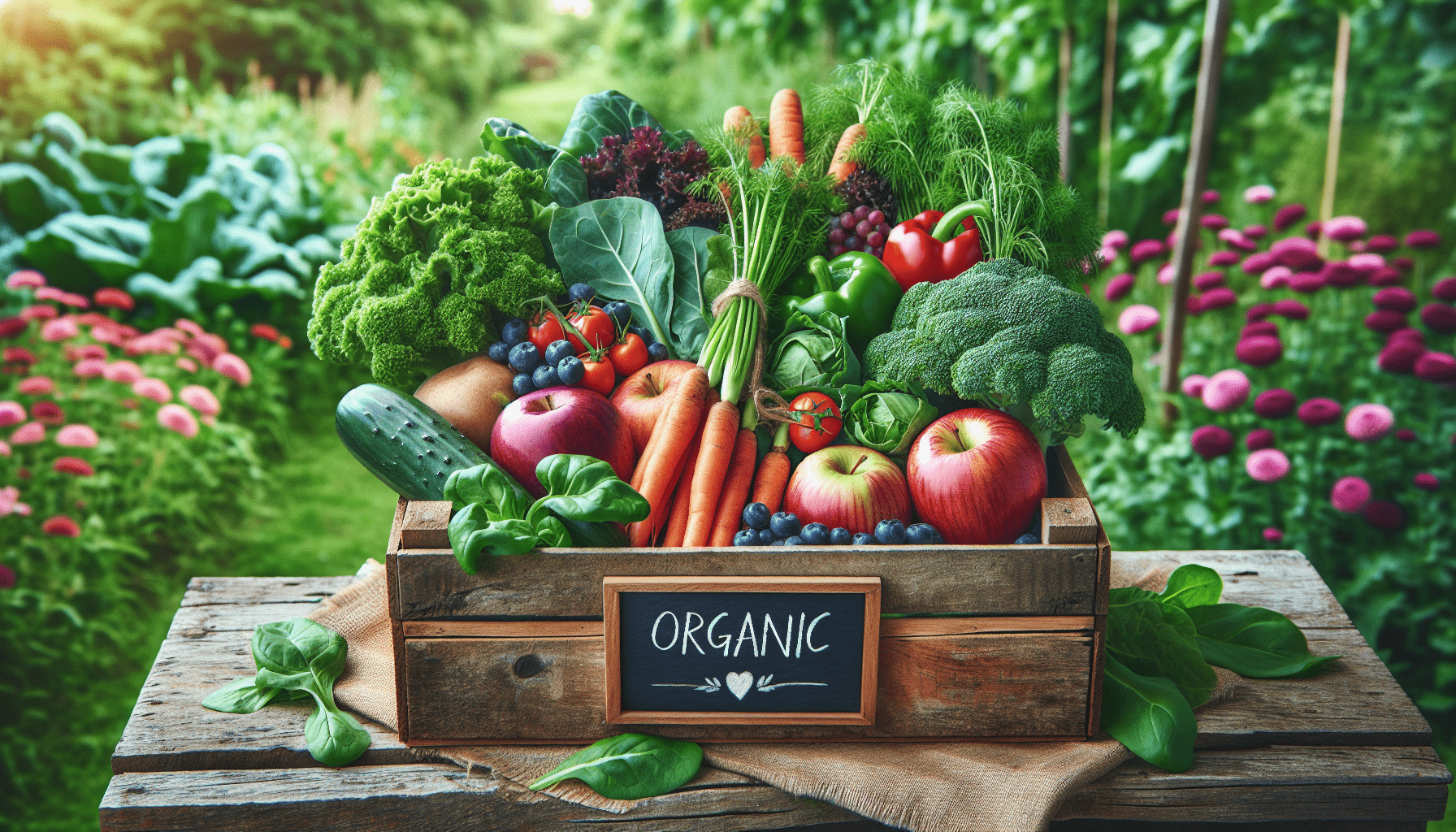In today’s fast-paced world, we’re all seeking ways to be healthier and feel our best. “Can Organic Food Improve Overall Health and Wellness” explores the potential benefits of choosing organic food for our diets. We delve into how consuming organic produce, meats, and dairy can impact our health. Focusing on nutrient content, reduced exposure to harmful chemicals, and environmental factors, we take a closer look at whether organic food can be a key ingredient in boosting our overall wellness. Let’s embark on this journey together and discover if making the switch to organic can truly make a difference in our lives. Have you ever wondered if switching to organic food might actually lead to better health and wellness for us all? With growing interest in living healthier lifestyles, eating clean, and reducing our environmental footprints, organic food has emerged as a popular choice among many of us. But does it live up to the hype, or is it just another trend?
In this article, we will explore the question, “Can Organic Food Improve Overall Health and Wellness?” We will dive into what organic food is, the differences between organic and non-organic foods, the potential health benefits, any drawbacks, and more. By the end, we hope you’ll have a clearer understanding of whether making the shift to organic food is right for your health and wellness journey.
What is Organic Food?
First, let’s define what we mean by organic food. Organic food is produced using methods that do not involve synthetic pesticides, chemical fertilizers, genetically modified organisms (GMOs), artificial additives, or irradiation. The practices aim to promote ecological balance, conserve biodiversity, and generally reduce pollution.
Criteria for Organic Certification
Products labeled as “organic” must meet strict guidelines set by regulatory bodies, such as the USDA in the United States. These guidelines cover various factors including soil quality, animal raising practices, pest and weed control, and the use of additives.
| Criteria | Organic Farming | Conventional Farming |
|---|---|---|
| Pesticides | Limited to natural pesticides | Synthetic pesticides allowed |
| Fertilizers | Organic compost and manure | Chemical fertilizers allowed |
| GMOs | Prohibited | Allowed |
| Animal Welfare | Access to outdoors and organic feed required | Often confined, non-organic feed allowed |
| Additives | Restricted usage | Extensive usage of artificial additives allowed |
Nutritional Benefits of Organic Food
One of the key reasons many of us consider switching to organic food is to boost our nutritional intake. Organic foods are often touted as being more nutritious than their conventional counterparts, but is that really the case?
Vitamin and Mineral Content
Studies have often shown mixed results, but some research indicates that organic produce may have higher levels of certain nutrients. For example, some organic fruits and vegetables have been found to contain higher levels of Vitamin C, iron, magnesium, and phosphorus.
Antioxidants
Various studies have indicated that organic produce can have a higher antioxidant content. Antioxidants help combat free radicals in our bodies, which can contribute to chronic diseases and aging.
Fatty Acids in Organic Meat and Dairy
Organic meat and dairy are often said to contain better fatty acid profiles, including higher levels of Omega-3 fatty acids. These healthy fats are crucial for cardiovascular health, brain function, and reducing inflammation.

Impact on Overall Health
Now that we’ve looked at the potential nutritional benefits, let’s evaluate if organic food can indeed make a tangible difference in our overall health and wellness.
Reducing Exposure to Pesticides and Chemicals
One of the most immediate advantages of eating organic food is the reduction in our exposure to harmful pesticides and chemicals. These substances have been linked to a variety of health problems including cancer, hormonal imbalances, and neurological issues.
Lowering Risk of Diseases
Reducing our exposure to synthetic chemicals can potentially lower the risk of certain diseases. For example, lower levels of pesticides have been associated with reduced risks of diseases ranging from cancers to neurological disorders.
Improved Mental Health
Believe it or not, what we eat also affects our mental health. Clean, organic food free from synthetic additives may contribute to better mental clarity, reduced risk of depression, and improved overall mood.
Environmental Benefits
While this article primarily focuses on health and wellness, it’s worth mentioning the positive environmental impact of choosing organic food. After all, a healthier planet means healthier inhabitants.
Lower Pollution Levels
By avoiding synthetic fertilizers and pesticides, organic farming practices help reduce water and soil pollution, contributing to a cleaner environment.
Soil Health
Organic farming emphasizes soil health through practices like crop rotation and composting, which enrich the soil without depleting its nutrients.
Biodiversity
Organic farms often support greater biodiversity, which can lead to more resilient ecosystems and reduced chances of pest outbreaks.

The Cost of Eating Organic
One of the most commonly cited downsides of organic food is its cost. It’s generally more expensive than conventional food, making it less accessible for some of us. But why is this the case?
Farming Practices
Organic farming is more labor-intensive and requires more meticulous care, driving up costs.
Lower Yields
Without the aid of synthetic chemicals, organic farms often produce lower yields, which can also contribute to higher prices.
Certification Costs
Obtaining organic certification is a rigorous and costly process for farmers, which can contribute to the higher prices of organic products.
Is Organic Food Worth the Cost?
Given its higher price point, many of us find ourselves questioning whether organic food is actually worth the cost. Here are some considerations to make an informed decision.
Prioritize Certain Foods
If a 100% organic diet seems too expensive, consider prioritizing organic options for foods that are most susceptible to pesticide residue, such as strawberries, spinach, and apples. The Environmental Working Group (EWG) publishes a list known as the “Dirty Dozen,” which can be a helpful guide.
| Food Type | Organic Priority | Reason |
|---|---|---|
| Strawberries | High | High pesticide residue levels |
| Spinach | High | Often contains pesticide residues |
| Apples | High | Frequently sprayed with pesticides |
| Avocados | Low | Natural protective skin reduces risk |
| Sweet Corn | Low | Lower pesticide residue risk |
Budget-Friendly Organic Options
Look for sales, buy in bulk, and consider joining a local CSA (Community Supported Agriculture) to make organic food more affordable.
Health Priorities
Factor in your own health priorities. If you’re dealing with specific health issues that could benefit from an organic diet, the investment might be worth it.

Organic Food Labels: Decoding Their Meaning
When navigating the organic section, you might come across various labels that can be confusing. Let’s break down what these labels actually mean to make informed choices easier for us.
USDA Organic
To earn this label, a product must contain at least 95% organic ingredients and comply with rigorous standards set by the USDA.
100% Organic
Products with this label are made entirely from organic ingredients and methods.
Made with Organic Ingredients
These products contain between 70-94% organic ingredients and must follow specific guidelines for the non-organic components.
Natural vs. Organic
It’s important not to confuse “natural” with “organic.” While “natural” products are minimally processed and free of synthetic additives, they aren’t necessarily organic and do not meet the same rigorous standards.
Concerns and Criticisms of Organic Food
In our quest to provide a balanced perspective, it’s essential to address some of the criticisms and concerns surrounding organic food.
Nutritional Superiority Controversy
While some studies show that organic foods are more nutritious, others indicate little to no difference in nutritional value compared to conventional foods. The inconsistency can leave many of us skeptical.
Accessibility Issues
The higher cost of organic food makes it less accessible to people with limited financial means. Until organic food becomes more affordable, its benefits may not reach everyone.
Organic Fraud
There have been instances where products labeled as “organic” did not meet the required standards. This “organic fraud” undermines trust and makes it difficult for consumers to know whether they are getting what they pay for.
Limited Shelf Life
Organic produce often has a shorter shelf life compared to conventional produce, primarily due to the absence of synthetic preservatives. This can result in increased food wastage if not consumed timely.

Organic Food Myths Debunked
There are several myths surrounding organic food that can lead to misconceptions. Let’s address and debunk some of these myths for a clearer understanding.
Myth 1: Organic Food is Always Healthier
While organic foods can offer various health benefits, they are not inherently more nutritious across the board. What matters more is the overall quality and balanced nature of our diet.
Myth 2: Organic Farming Uses No Pesticides
Organic farming does use pesticides, but they are natural or non-synthetic and are generally considered safer than synthetic ones. However, “natural” doesn’t automatically mean “safe” and should be used appropriately.
Myth 3: All Organic Foods are Locally Grown
Not all organic foods are locally sourced. Many organic products are imported, which could offset some of the environmental benefits due to transportation emissions.
Conclusion: Can Organic Food Improve Overall Health and Wellness?
So, can organic food improve our overall health and wellness? The answer appears to be multifaceted.
Yes, But With Considerations
- Nutritional Benefits: Some organic foods are richer in certain nutrients and antioxidants, which can contribute to better health.
- Lower Chemical Exposure: Organic foods reduce our exposure to harmful pesticides and additives, which may lower the risk of various health issues.
- Environmental Impact: By choosing organic foods, we support farming practices that are better for the environment, which indirectly contributes to our well-being.
It’s a Personal Choice
Ultimately, whether or not to go organic is a personal choice that depends on various factors including budget, health priorities, and environmental concerns. While organic foods offer numerous benefits, they are not a panacea. A balanced diet, mindful eating, and overall healthy lifestyle choices are equally important.
By understanding both the potential benefits and limitations, we can make informed choices that best suit our individual needs and contribute to our overall health and wellness.
Thank you for reading, and we hope this article has provided valuable insights into the world of organic food. Whether you choose to go fully organic or incorporate a mix of organic and conventional foods, making educated decisions is key to enhancing our health and wellness.